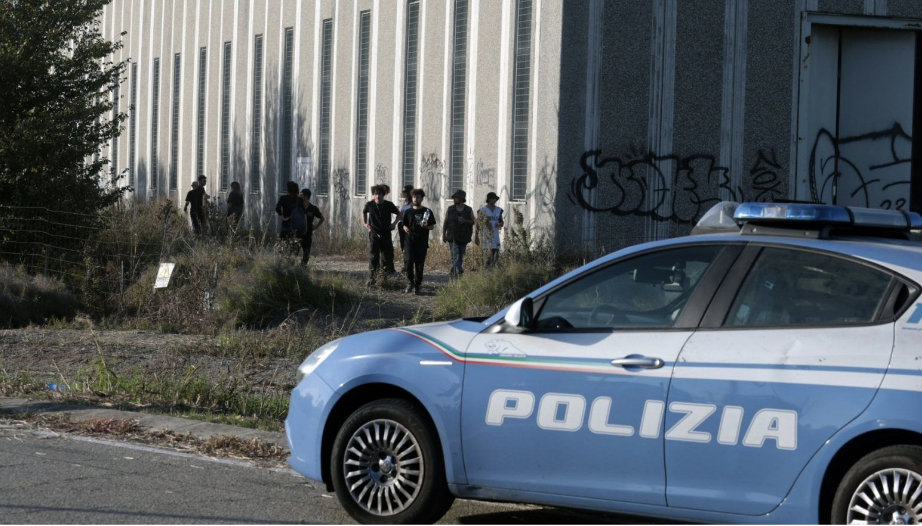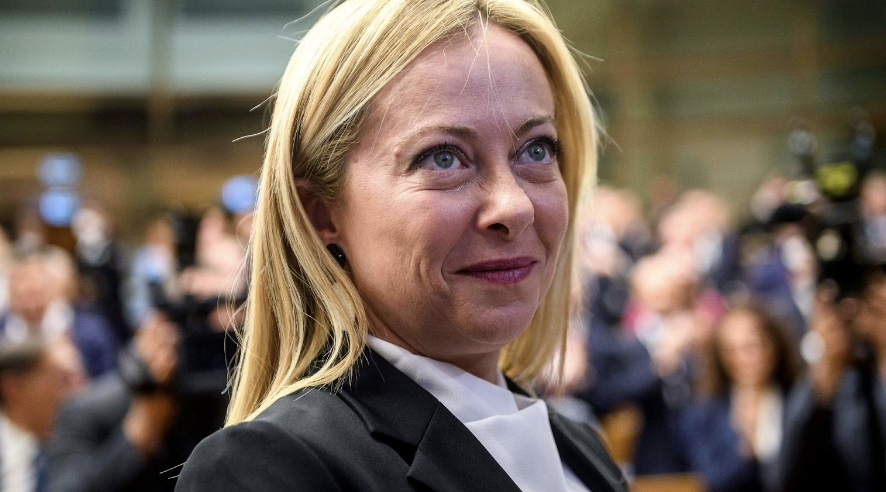Italian Prime Minister Bans Raves, Allows Fascist March
Police outside of a warehouse near Modena, Italy, the site of an unlicensed rave. Photo: ITALY24
Italian Prime Minister Giorgia Meloni of the Brothers of Italy party announced a decree banning unlicensed raves on October 31, but allowed Mussolini admirers and fascist supporters to march to the dictator’s burial grounds, signifying a potentially dangerous new chapter for Italy.
The decree outlaws gatherings of more than 50 people “for the purpose of organizing a gathering from which a danger to public safety or public health may arise” and raises the stakes: people prosecuted can face up to 6 years in prison and a fine of €10,000.
It came after a rave in Modena with approximately 1,000 attendees that occurred over Halloween weekend. Neighbors complained about the noise and traffic disruptions and called the police. The rave goers peacefully dispersed after the police arrived, according to Reuters.
Meloni and her party have drawn much criticism for the apparent double-standard between their harsh response to the rave and a lack of response to the fascist march, which drew crowds of 2,000-4,000.
Giorgia Meloni was sworn in on October 22 and leads Italy’s most far-right government since the end of World War II. While both Meloni and her party have neo-fascist roots–as a teenager, she joined the Youth Party of the Italian Social Movement (MSI), the neo-fascist movement that emerged after WWII and helped create the Brothers of Italy– she has vehemently denied being fascist.
Recently elected Italian Prime Minister, Giorgia Meloni. Photo: CNN
The crackdown on certain freedoms of expression demonstrated by this ban stands in line with Meloni’s views on the LGBTQ+ community and highlights a common “law and order” stance heralded by the far-right.
Prior to her election, Meloni spoke out against “gender ideology” and “the LGBT lobby,” according to NBC News.
Many worry that this rhetoric will lead to even more homophobia and transphobia within Italy, endangering those in the community and that it is a sign of what is to come.
The crackdown on social movements or groups seen as other has a long history around the world. Extremist governments see these as a danger to the society they are trying to implement, and believe they must be stifled. The anti-LGBTQ+ rhetoric and banning raves in Italy are just the most recent examples.
Raves are safe-spaces for people to express themselves however they wish–and maybe in ways that they do not feel comfortable doing in their everyday lives, especially if they are part of the LGBTQ+ community. Attendees can dress up, do their makeup, interact freely with others, and forget about the outside world for a few hours. It is a space that is almost separate and disconnected from the confines of normal society and limiting its existence has significant effects on people's freedom of expression.
“I would like to say that it is a norm that I claim and I am proud of because Italy - after years of governments that have bowed its head in the face of illegality - will no longer be a black shirt when it comes to security,” said Meloni on a Facebook post addressing the ban.
Her emphasis on a “return to order” after accusing previous governments of not doing enough to fight “illegality” in the country falls in line with typical far-right views.
Far-right politicians and governments often double down on crime, such as Nixon’s War on Drugs or Trump’s campaign promise to build a wall between the U.S.-Mexico border to keep out illegal immigrants.
It also raises the question: If this is Meloni’s response to relatively harmless raves, what does that mean for her responses on other issues, such as immigration or crime?
Meloni is already known for having a hard anti-immigration stance- she gained many supporters through this- and even went as far as proposing a naval blockade of the Mediterranean in order to prevent immigration from North Africa, according to NPR.
It remains to be seen whether Meloni and her government will embrace their fascist roots and continue cracking down on “counter-expressions” or develop a more moderate stance, and what effects her policies will have on Italy, its people, and the world.


